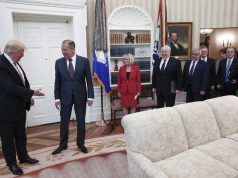[embedyt]http://www.youtube.com/watch?v=RkkiqrJL2v8[/embedyt]Marquel, TPVs NYTimes Embarrassing Secret Stupidities Section correspondent, was writing a letter to his childhood pet, Ray, when he read Documents Unsealed in Yahoo’s Case Against U.S. Data Requests. A federal court ordered the release of about 1,500 pages of documents containing arguments and evidence in Yahoo’s challenge to government surveillance. Marquel pored over the evidence. These were the arguments made to the Secret Court about whether Yahoo had to turn over literally all its email traffic without, as Yahoo put it, “even one suspect for whom the government had evidence of a crime.”
Because these are only Yahoo documents we don’t know for sure what other companies did. But apparently only Yahoo went to bat to defend the Constitutional interests of its customers. ATT, Verizon, & TMO clearly simply delivered all their domestic email traffic to the government.
But Marquel remembered tenth grade. People are supposed to be protected in their homes and government couldn’t seize evidence without a search warrant supported by probable cause. Here there was no warrant nor any probable cause at all. How could there be probable cause against millions of ordinary Americans. Marquel knows a fishing expedition when he sees one and they are unconstitutional.
Mufi had given Marquel all the documents released and the arguments, let’s just say, made Marquel’s jaw drop.
The government first asserted that it
“can do anything it wants because it is in charge. As President Bush said, we are the deciders.”
Yahoo questioned this by saying that
“the supreme law of the land, more decisive than any statute, any court decision, any military order, and certainly executive decision, is the constitution. It says so on it’s face.”
The government objected to that saying,
“in time of war, the Constitution loses its force “
Yahoo asked the government to point out the section of the constitution that says it doesn’t apply
” in time of war.”
The government replied that,
“there is no specific provision. The most important and powerful provisions of the constitution are often found in its very structure, or in unstated assumptions that support the most important sections.”
Yahoo then said that
“when the issue is the citizens’ rights to be free of unlawful search and seizure, a specific provision is required. This is obvious from the fact that the Sixth Amendment is itself a specific provision, not some unstated assumption or structural feature.”
The court seems to have rejected Yahoo’s arguments, with the equivalent of a “because” that so frequently frustrates and enrages children asking for a reason.
The constitution didn’t matter, said the Court, because there were “terrorists lurking.” But Marquel seemed to remember that the constitutional guarantees were there not to be enforced in times of comfort, but in times of stress and war when the government is more likely to violate the supreme law.
The court however was of a different mind. It ordered all the emails turned over and didn’t cite one Supreme Court opinion that would allow it, except for Korematsu, which upheld the interning of Americans of Japanese descent during WWII, and for which the government has since apologized as wrongly decided.
Yahoo tried and tried but each time they raised a more sophisticated argument, both the government and the Court offered correlatively stupider answers.
Yahoo suggested only giving emails sent to or from known terrorists. The Court said,
“if they were looking for only known terrorists, they would already have that information and wouldn’t need these emails.”
Confirming of course that this was a fishing expedition in our private correspondence.
The government said Yahoo was stonewalling and trying to hide its terrorist customers. Then Yahoo said,
“point out one terrorist and we’ll give you all the emails.” That was a dangerous go-for-broke strategy, but the government mooted it saying, “if we knew who the terrorists were, we wouldn’t need all these emails.”
The Court almost got it then but proved too stupid to grasp the issue.
“Yahoo suggests giving the name of one terrorist. But that would reveal exactly that which must be kept secret. Yahoo is stonewalling and must turn over the documents immediately before the terrorists kill us all.”
“I don’t know who these judges are, “thought Marquel, “but they’re obviously not appointing the brightest ones around. In fact they seem to be the most cowardly, in every way. It takes courage to apply the law in times of public panic, and these are not courageous judges.”
And then it got really crazy.
Yahoo told the Court that this should be a free and open society.
“Not here,” said one judge. “See that sign? Secret Court. Everything here is secret. We’re not even here. Nothing’s free and open. Everything’s secret and closed.”
“But your honor,” said Yahoo, “this is still America.”
“Nope. It’s all secret. Everything is secret here. Sssshhh…!” Said the judge.
“Not America? Of course it is. And we have a constitution that forbids unreasonable searches and requires probable cause before the government seizes private property.” said Yahoo.
“My Lord!” Said the judge. “What nonsense. There is no constitution here that says that.”
Yahoo asked, “what does the constitution say here?”
“I can’t tell you. It’s all secret. Do you understand secret? When things are secret, nobody knows. That’s what’s in the constitution here. The secret constitution.” Said the judge.
“Your honor, that’s impossible.” Said Yahoo.
“You want to know what’s impossible?” Asked the judge. “Finding our secret prisons. And if they can’t be found, nobody would be able to get you out.”
“Your honor, are you threatening me?” Asked Yahoo. “I would be missed “
“No you wouldn’t because I’m not threatening you, I’m threatening your family. They’ll be in there with you and nobody’ll miss anybody. It’s secret. ” Said the judge.
“Your honor…” Said Yahoo.
The judge said, “give the government all your emails. Don’t tell anyone. Say you had a job interview. Not a word about this, do what the NSA wants and remember….”
“Yes?” Asked a certainly shaken Yahoo.
“This is all secret. It never happened. Sssshhhh! This case is secretly dismissed. Bailiff, hit that hammer. Quietly. Sssshhhh.”
That’s how the transcript ended. If you want to complain to the NSA, send an email.
To anyone.
***
BY MARQUEL: Nineteen Eighty-Four or 2014














Amazing!
I’m speechless
Marquel, you’re a superb writer
amazing piece. I love you!
perfect pitch
ditto
ditto2
Wow! Thanks for writing about this horrible situation!
What about Google compliance?
how come everybody is quite about Google spying?